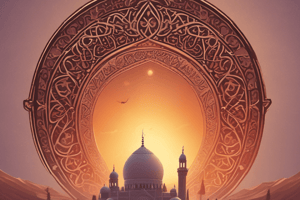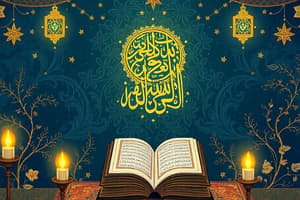Podcast
Questions and Answers
When did the process of compiling the Quran into its canonical form take place?
When did the process of compiling the Quran into its canonical form take place?
- More than 1000 years after the Prophet's death
- 100 years after the Prophet's death
- 500 years after the Prophet's death
- During the Prophet Muhammad's lifetime (correct)
What is the Quran often referred to as?
What is the Quran often referred to as?
- The Final Testament (correct)
- The Ancient Testament
- The New Testament
- The Middle Testament
What does the Quran emphasize in terms of God (Allah)?
What does the Quran emphasize in terms of God (Allah)?
- The multiplicity of Gods
- The oneness and unity of God (correct)
- The trinity of God
- The duality of God
What is one unique feature of the Quran's literary style?
What is one unique feature of the Quran's literary style?
What is the name for the tradition of interpreting the Quran beyond its literal meanings?
What is the name for the tradition of interpreting the Quran beyond its literal meanings?
How has the Quran been preserved and transmitted according to the text?
How has the Quran been preserved and transmitted according to the text?
What role does the Quran play in the lives of Muslims today?
What role does the Quran play in the lives of Muslims today?
How has the Quran influenced art, architecture, poetry, and literature?
How has the Quran influenced art, architecture, poetry, and literature?
Which Islamic practice is directly influenced by the teachings of the Quran?
Which Islamic practice is directly influenced by the teachings of the Quran?
What aspect of the Quran continues to guide and inspire Muslims according to the text?
What aspect of the Quran continues to guide and inspire Muslims according to the text?
Study Notes
Embracing the Quran: The Holy Word of Islam
The Quran, often referred to as the Final Testament or Book of Revelation, is the central religious text and a chief source of guidance for Muslims worldwide. A testament to the richness of Islamic spirituality, this sacred scripture has been meticulously preserved and transmitted for centuries, serving as a beacon of wisdom that continues to illuminate the lives of believers.
Compilation and Origins
The Quran is believed to have been revealed to the Prophet Muhammad over a period of 23 years, beginning in 610 CE. Although it originated from a divine source, the Quran's compilation and organization evolved through a process of revelation, memorization, and compilation by early Islamic scholars. The Quran's earliest written form was inscribed on parchment and papyrus, and it was eventually compiled into the canonical form that Muslims revere to this day.
Unparalleled Literary and Theological Masterpiece
The Quran is renowned for its unique style, which combines poetic beauty and profound spiritual wisdom. This literary masterpiece uses a variety of literary techniques, including poetry, prose, parables, and anecdotes, to convey its teachings. The Quran promotes monotheism, ethics, and justice, and it emphasizes the oneness and unity of God (Allah).
Dual Revelation and Interpretation
The Quran is believed to have two layers of meaning: the literal or apparent meaning (zahir) and the hidden or esoteric meaning (batin). The Quran's esoteric dimensions have inspired scholars and spiritual seekers to transcend its literal meanings for centuries, resulting in a vibrant and ever-evolving tradition of interpretation, or Tafsir.
Preservation and Transmission
The Quran has been preserved and transmitted through a carefully guarded chain of custody, known as Isnad. This chain consists of people who have heard, read, and memorized the verses of the Quran from the Prophet Muhammad and other companions. The Quran has been passed down orally, written, and printed in numerous calligraphic styles, emphasizing its importance in the Islamic world.
Influence and Impact
The Quran has shaped the development of Islamic thought, law, and culture, and its influence extends far beyond the confines of the Islamic world. The Quran's teachings have inspired art, architecture, poetry, and literature, and it has served as a source of spiritual guidance for millions of people across the globe.
The Quran Today
Today, the Quran continues to hold a central place in the lives of Muslims, who read, memorize, and recite its verses daily for spiritual, intellectual, and social enrichment. The Quran's teachings form the basis of Islamic jurisprudence, ethics, and spirituality, and it serves as a source of comfort and inspiration for Muslims around the world.
In conclusion, the Quran is a marvelous testament to the wisdom and spiritual depth of the Islamic tradition. A treasure trove of spiritual insight, literary beauty, and ethical wisdom, the Quran continues to guide and inspire Muslims, and its influence can be felt throughout the world.
Studying That Suits You
Use AI to generate personalized quizzes and flashcards to suit your learning preferences.
Description
Explore the compilation, literary excellence, interpretations, preservation, and impact of the Quran in this enlightening quiz. From its origins to its influence on Islamic thought and culture, delve into the profound teachings and significance of this revered text.





